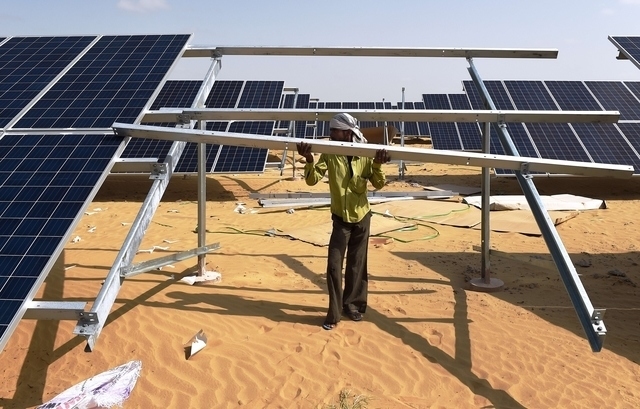Rudd and Paulson: How China, India, and the U.S. Can Forge a Clean Energy Future

In this photograph taken on August 23, 2015, an Indian engineer fixes a solar panel into position at the under construction Roha Dyechem solar plant at Bhadla some 225 kms north of Jodhpur in the western Indian state of Rajasthan. (Money Sharma/Getty Images)
In a Guardian op-ed published November 30, as the United Nations’ COP21 climate summit opened in Paris, Asia Society Policy Institute President Kevin Rudd and Paulson Institute President and former U.S. Treasury Secretary Hank Paulson explore the “encouraging possibilities for China, the US and India — which together make up roughly 40 percent of global carbon emissions — to become global leaders in a new and more sustainable energy future.”
Rudd and Paulson write:
This is a promising time for developing countries like China and India to forge a low-carbon economic pathway. Unlike the US during its industrial heyday, they can capitalise on the effective and affordable energy technologies widely available to accelerate their energy transition. Such a move would be a boon to the global clean energy business, including the US — home to the majority of clean energy patents. These must be developed and brought to market as a matter of global urgency.
But to make real progress the US, China and India must direct more public and private resources to the climate challenge. Less than 2% of global public research and development dollars are spent on renewable energy — a paltry $5bn in total. China, the US and India could show global leadership by directing, say, 5% of their public research and development budgets towards climate challenges. All three should also collaborate to leverage enormous private sector investment in new energy technologies and innovative infrastructure projects that reduce the global carbon footprint.
The two authors conclude that “the ‘big three’ can help bridge the divide between the developing and developed countries involved in climate negotiations” by developing new financing models and pursuing other cooperative climate change strategies.
Read the full op-ed on the Guardian website.
Watch Asia Society Policy Institute President Kevin Rudd discuss the ongoing Paris climate talks with CNN's Christiane Amanpour:


